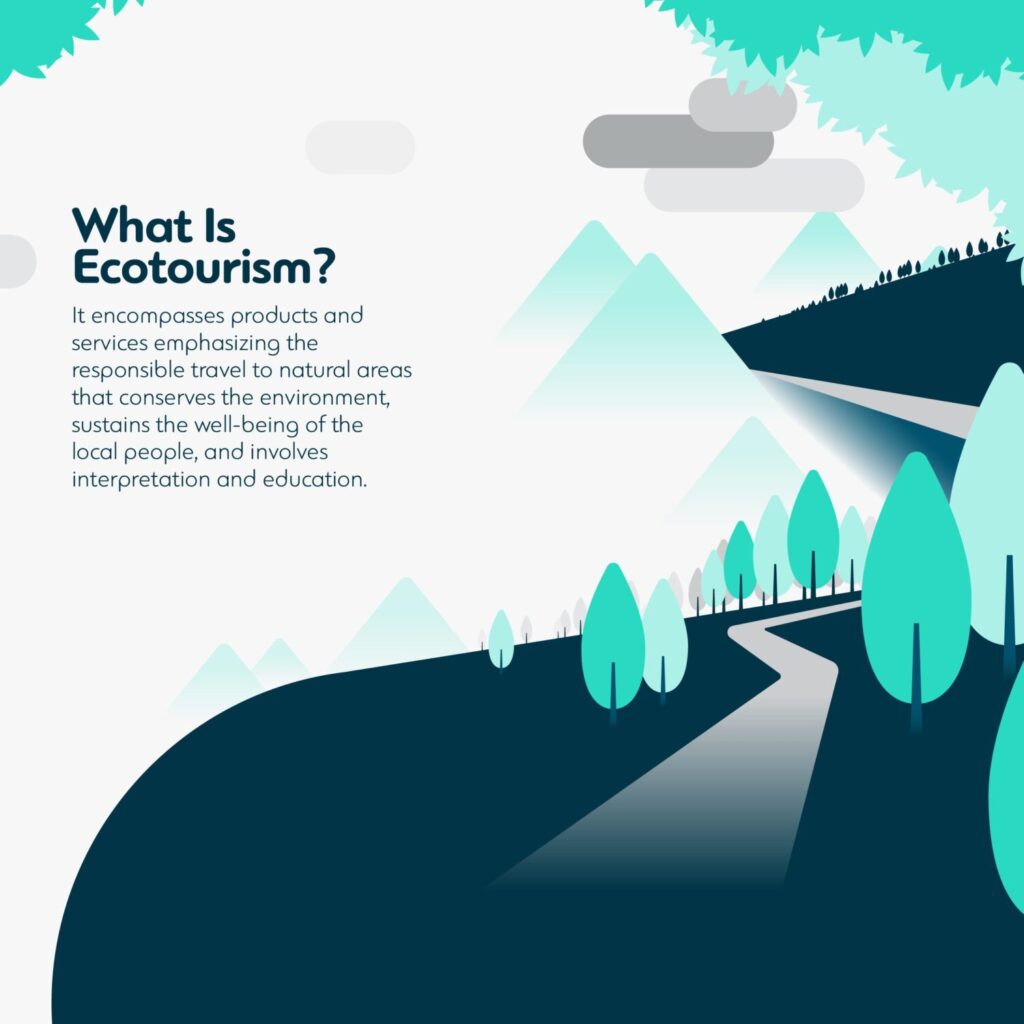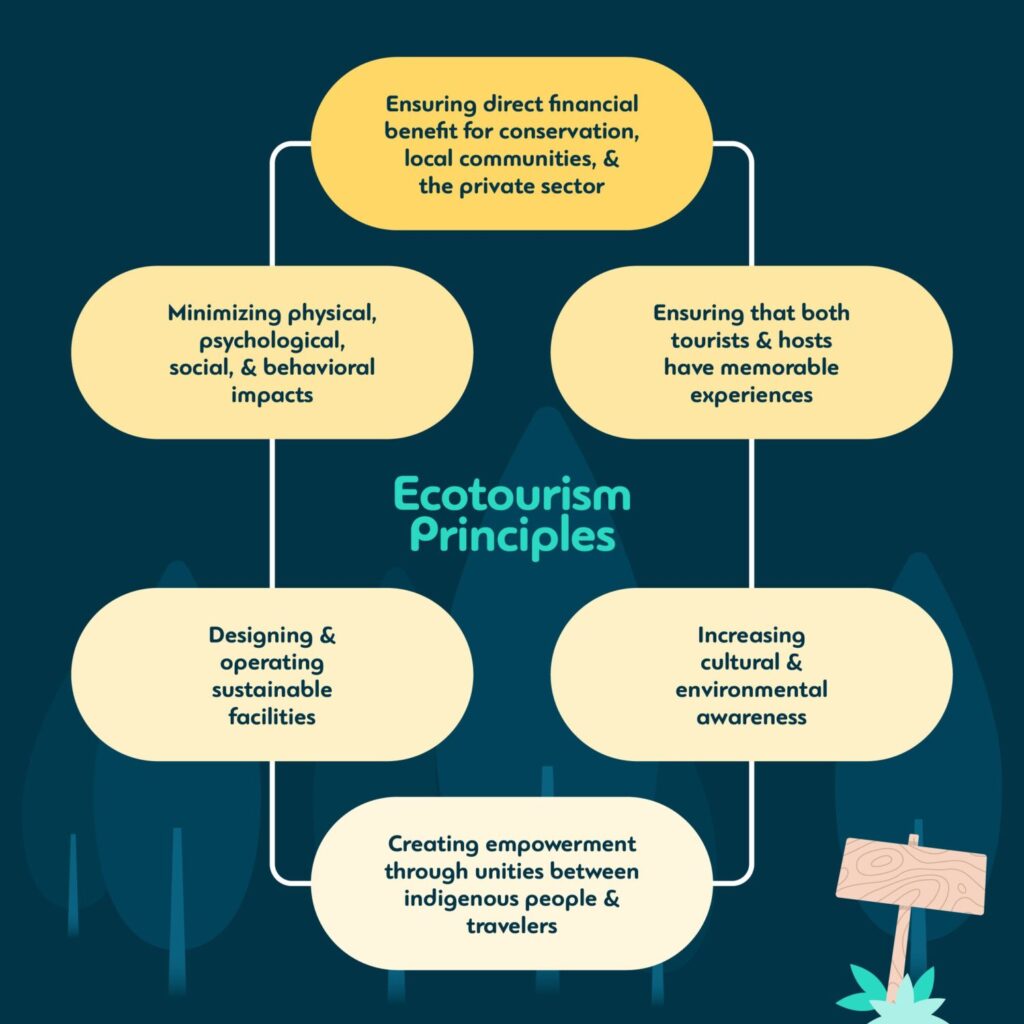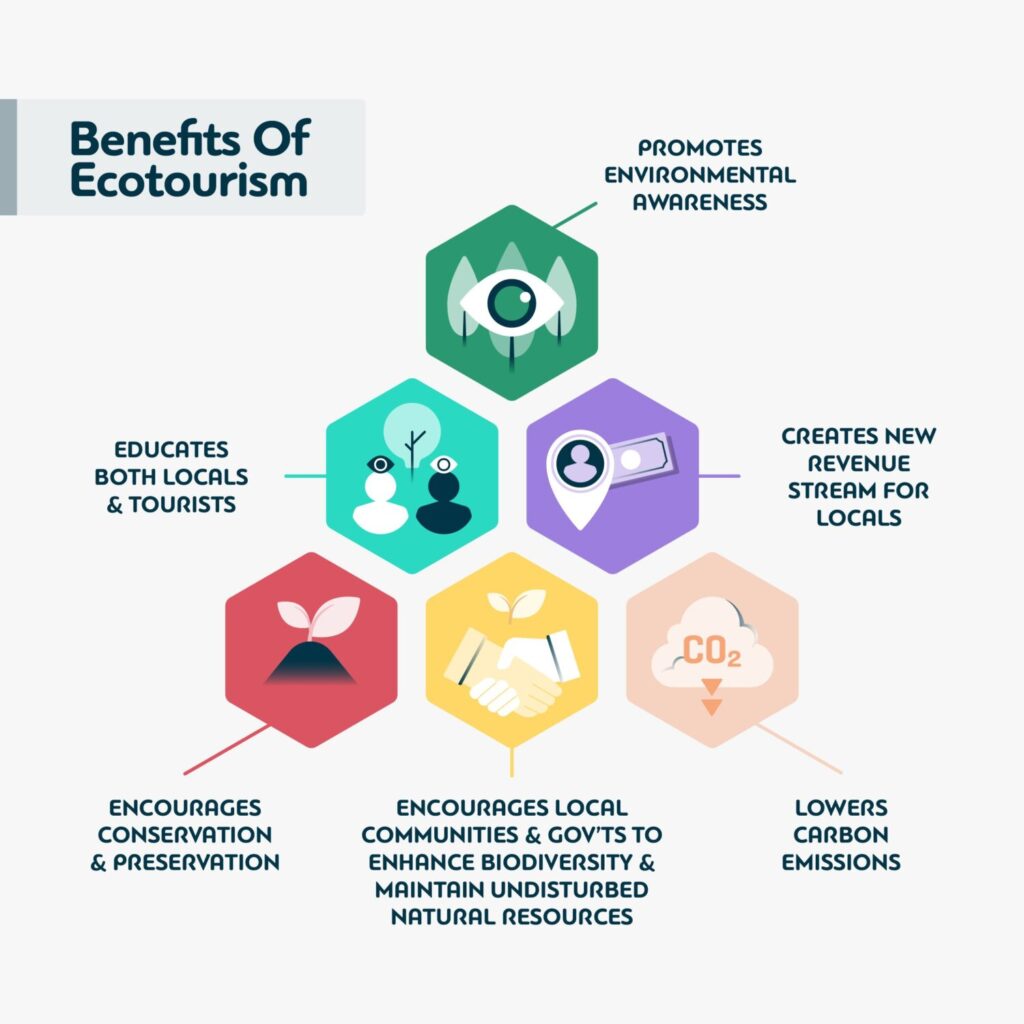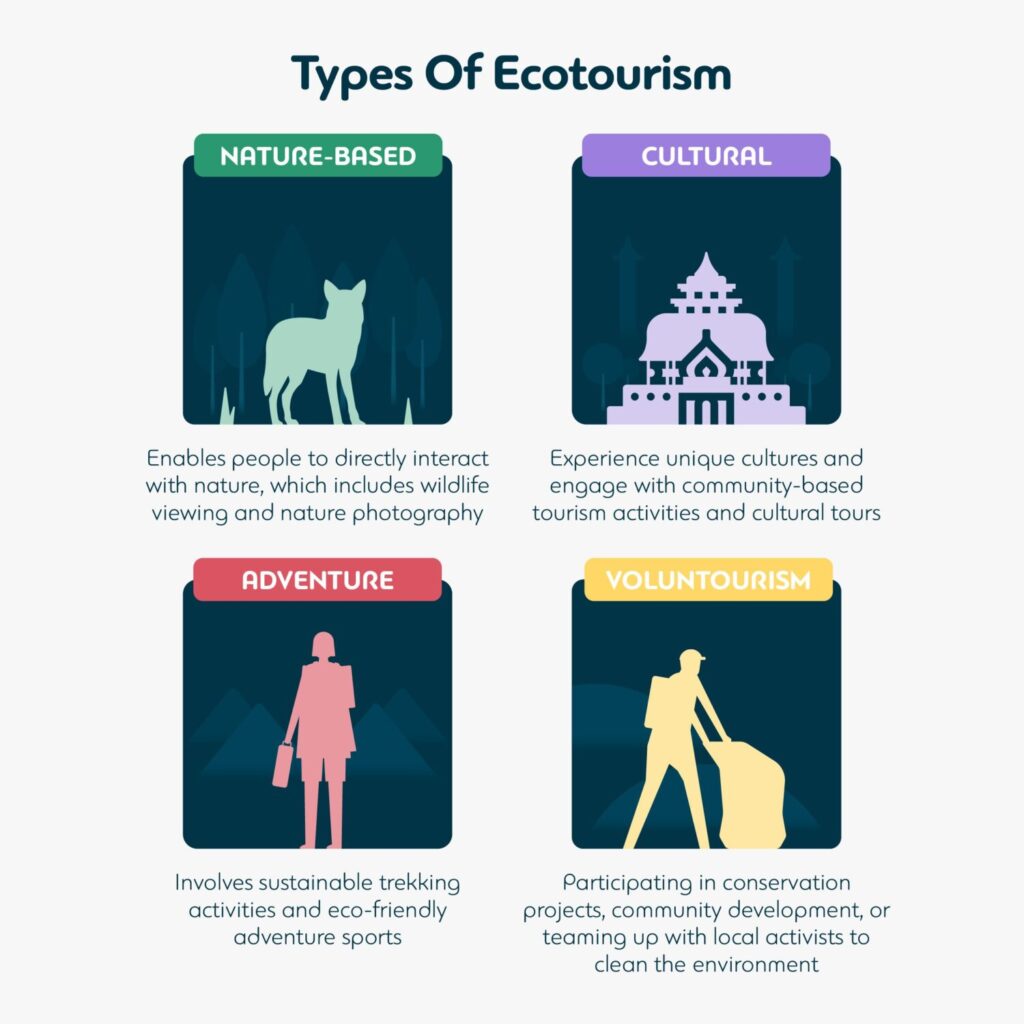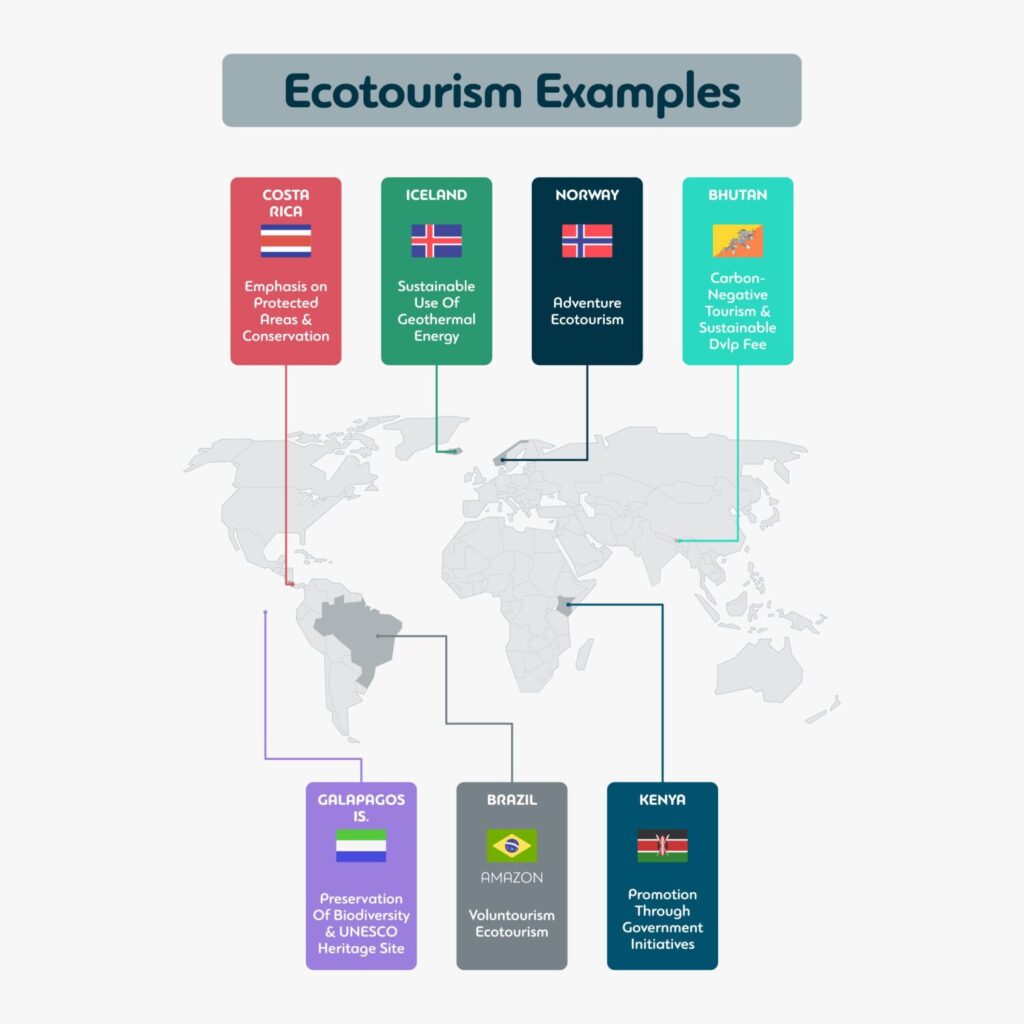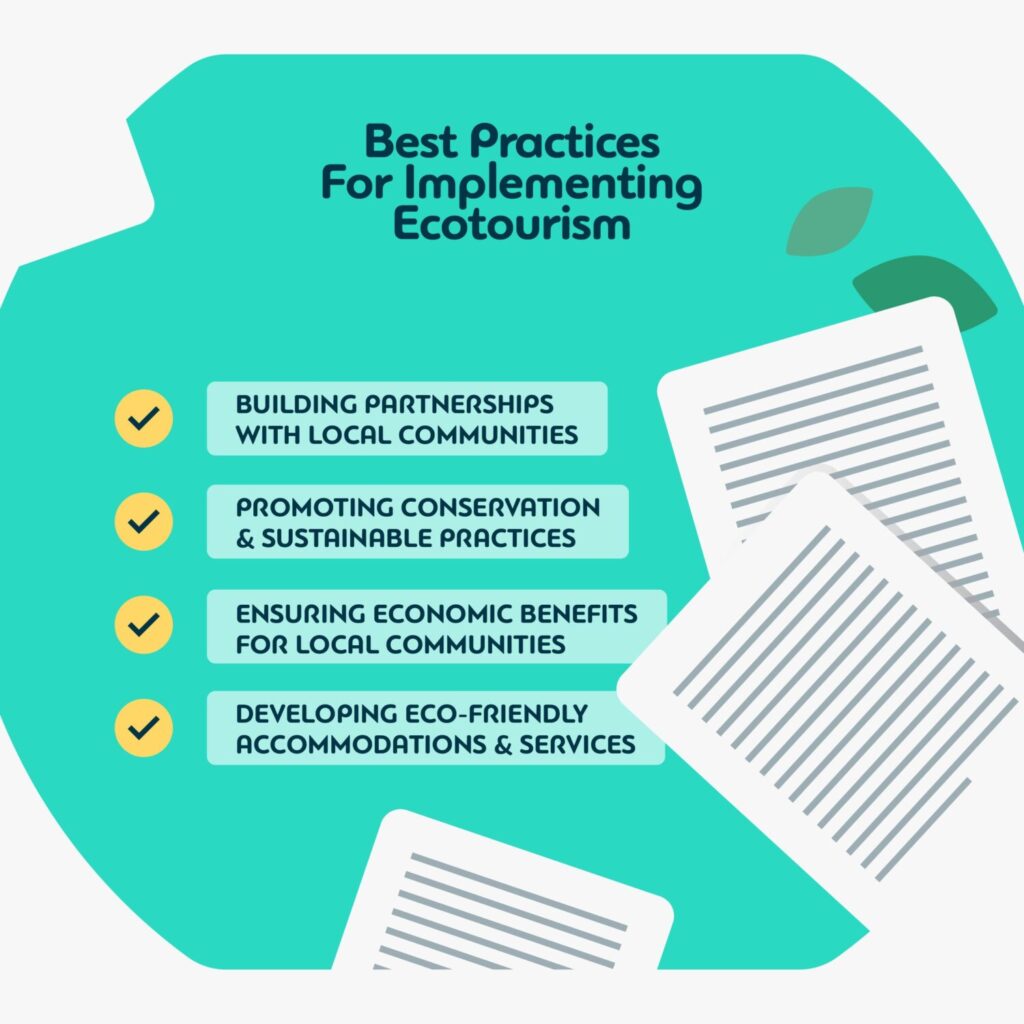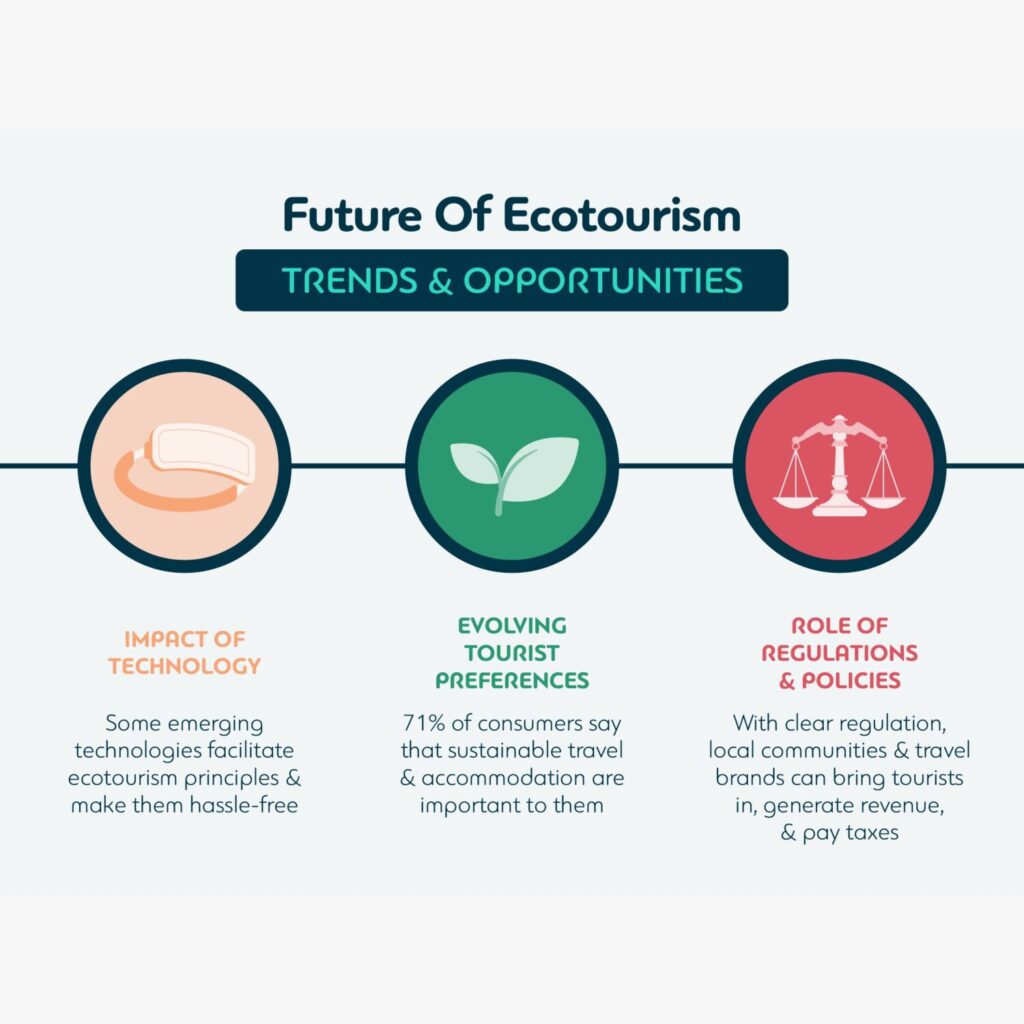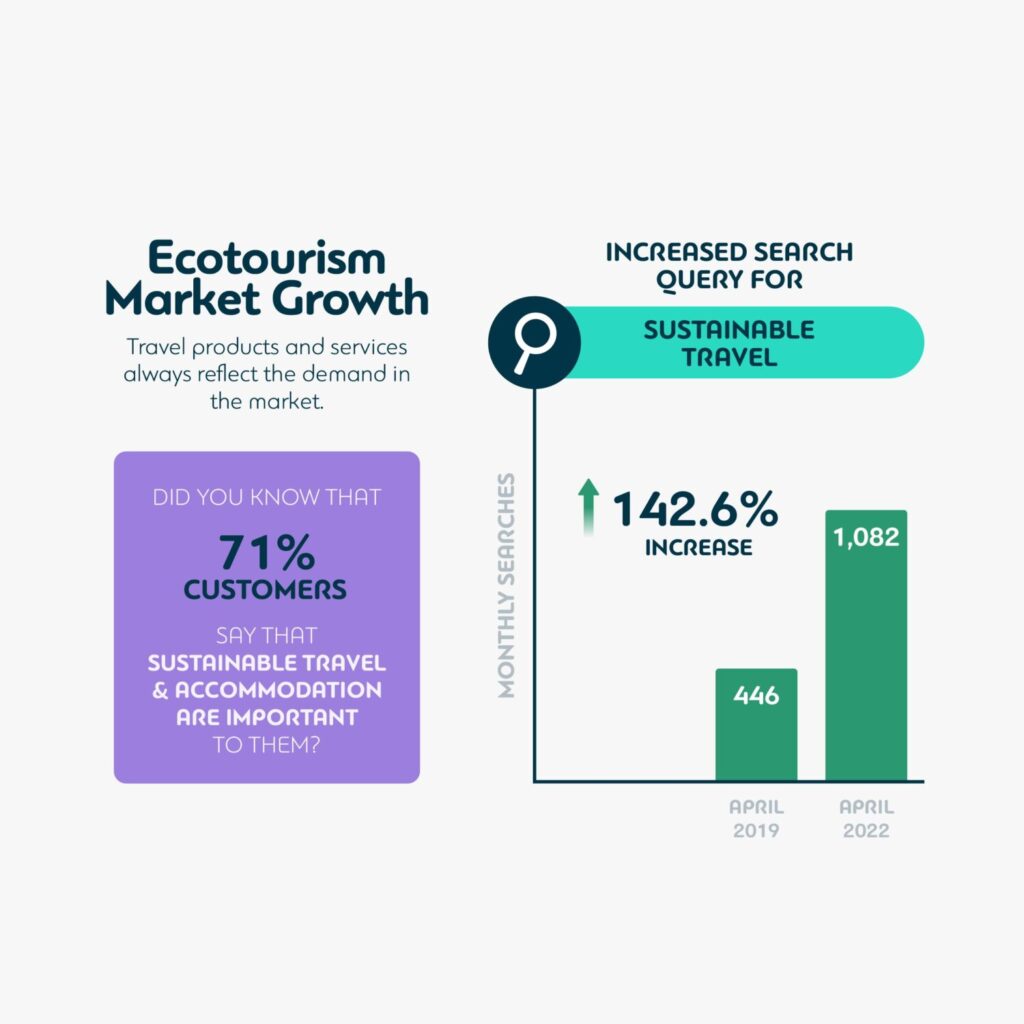Ecotourism 101: Ecotourism Examples, Definition & Best Practices
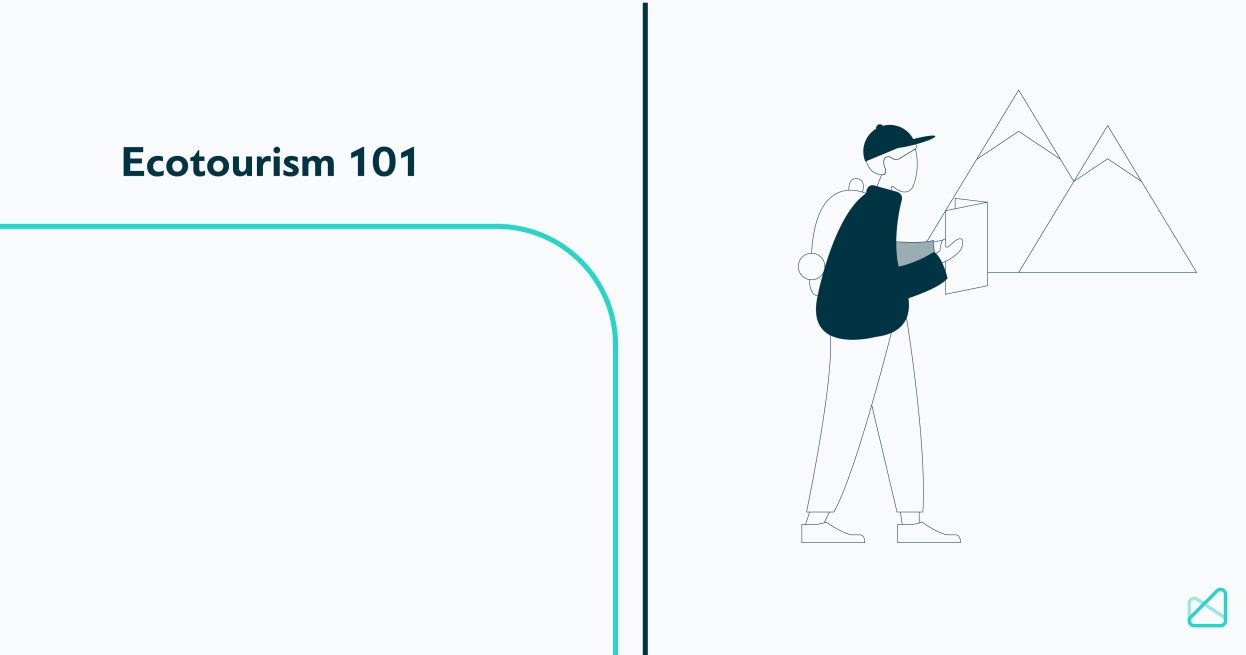
If you are closely keeping tabs on the travel industry, you probably know it’s one of the most dynamic landscapes. The chances are that this phenomenon results from how agile businesses in the sector are. In other words, the tourism industry’s products and services always reflect the most recent consumer needs and expectations.
One of the newer tourism branches is ecotourism which reflects the needs of consumers interested in minimizing their carbon footprint while traveling while preserving nature. Although relatively new, this travel trend is quite important given that it revolves around conserving the environment and trying to improve the well-being of the local communities.
Below you can find everything about this travel sector, including ecotourism examples, definitions, best practices, and more.
What is Ecotourism: A Conceptual Understanding
Before we move on, let’s first define what ecotourism is. The widely accepted ecotourism definition goes along the following lines:
“Ecotourism encompasses products and services emphasizing the responsible travel to natural areas that conserves the environment, sustains the well-being of the local people, and involves interpretation and education.”
Simply put, ecotourism is where sustainable travel and conservation meet. If you look at ecotourism activities, you will notice they all have something common. These “things” are called ecotourism principles, and they include:
- Ensuring direct financial benefit for conservation, local communities, and the private sector;
- Minimizing physical, psychological, social, and behavioral impacts;
- Ensuring that both tourists and hosts have memorable experiences;
- Increasing cultural and environmental awareness;
- Designing and operating sustainable facilities;
- Creating empowerment through unities between indigenous people and travelers.
Ecotourism has several roles. The most obvious role would be the preservation of the environment, including natural resources. As the sub-component of sustainable tourism, it also promotes the preservation and conservation of cultural as well as natural resources.
Since it has a couple of roles, ecotourism offers numerous benefits. The most noteworthy ones include:
- Promotes environmental awareness;
- Educates both locals and tourists;
- Creates new revenue stream for locals;
- Encourages conservation and preservation;
- Encourages local communities and governments to enhance biodiversity and maintain undisturbed natural resources;
- Lowers carbon emissions.
Types of Ecotourism
While it may appear as a coherent field, ecotourism is quite a diverse niche. In fact, there are four unique types of ecotourism. The types come from the kind of activities that tourists can engage in.
Nature-based Ecotourism: Direct interaction with nature
As the name implies, nature-based ecotourism is all about enabling people to directly interact with nature. The imperative is to allow consumers to experience nature firsthand while ensuring nothing is disturbed. The most common nature-based ecotourism activities include wildlife viewing and nature photography.
Cultural Ecotourism: Focusing on local cultures, traditions, and customs
Some destinations have to offer more than natural attractions. Some places are attractive to tourists because of the local communities that live there. Many things can make a community unique, but in this case, it’s culture. Many consumers want to experience unique cultures and engage with community-based tourism activities and cultural tours.
Adventure Ecotourism: Combining Thrill and Sustainability
Adventure tourism is as old as tourism itself. Adventure ecotourism is one of its newest sub-components. Destinations can attract responsible consumers if they market their activities as eco-friendly. Some examples include sustainable trekking activities and eco-friendly adventure sports.
Adventure ecotourism is also attractive to businesses looking for eco-friendly alternatives to traditional team-building meetups.
Voluntourism: Combining travel with volunteering for good causes
Consumers deeply devoted to preserving nature are interested in a specific type of ecotourism called voluntourism. Look at it as a combination of travel and volunteering centered around a good cause. Some examples of voluntourism include participating in conservation projects, taking an active role in community development, or teaming up with local activists to clean the environment.
In-Depth Ecotourism Examples
Now that you understand what ecotourism really is let’s see how ecotourism principles reflect on specific initiatives. Here are a couple of ecotourism examples to learn from.
Costa Rica: Emphasis on Protected Areas and Conservation
Costa Rica is a perfect ecotourism example to learn from because it’s deeply embedded into Forever Costa Rica’s Protected Areas Program. The program was launched in 2010, and so far, it raised over $5 million. Making the program a national strategy enabled Costa Rica to complete 97% of the planned projects.
The focus was and still is on protected areas and conservation. The projects aimed to improve collaboration with local communities and use technical tools to improve the control of protected areas and monitor their management. As a result, the country has to offer over 26 national parks, 58 wildlife refuges, 15 wetland areas, 32 protected zones, and 8 biological and 11 forest reserves.
Iceland: Sustainable Use of Geothermal Energy
Iceland is another excellent example of a leader in the world of ecotourism. Once again, it all happened because the government took an active role in bringing the entire country as closely as possible to zero carbon emissions.
Iceland’s strongest suit is geothermal energy. In fact, approximately 85% of primary energy use in this country comes from renewable sources, and 66% of energy use comes from geothermal sources. According to the same source, more than 90% of homes in Iceland are heated with this type of energy. The country also uses geothermal energy to keep the streets free of snow and ice.
Bhutan: Carbon-Negative Tourism and Sustainable Development Fee
Bhutan is an attractive tourist destination found on the bucket lists of many consumers. The key people in its government know the country’s strengths lie in its unique nature and culture – and to conserve and preserve it, the country needs money. To secure the cash, Bhutan decided to implement a Sustainable Development Fee.
The carbon-negative tourism and sustainable development fee supports cultural and environmental development. At the start of 2023, the country raised the fee to fund all the projects aiming to promote and ensure sustainability.
Galapagos Islands: Preservation of Biodiversity and UNESCO Heritage Site
We can’t talk about ecotourism without mentioning Galapagos Islands. This destination is famous for its unique flora and fauna. Some species are endemic, and you can’t see them anywhere if you don’t visit Galapagos. Back in 1976, Galapagos was designated a Natural World Heritage site.
UNESCO designated it a Biosphere Reserve in 1984 and 17 years later a Ramsar Site. The islands also have exclusive sustainable travel partners. You won’t be able to engage in sustainable tourism in Galapagos if you don’t strive to make your business environmentally friendly, source locally produced products, and work with local employees.
Kenya: Promoting Ecotourism through Government Initiatives
Kenya is a prominent example of how to do ecotourism right because the government actively established clear rules, regulations, and policies to promote it. What is it all about? Well, one of the government’s primary goals is to attract tourists to Kenya, especially those that value wildlife and nature.
The country’s official organization Ecotourism Kenya is responsible for promoting responsible tourism activities. The organization encourages all parties engaged in tourism to adopt responsible practices.
Additional examples highlighting different types of ecotourism
There are many examples of ecotourism. Here are a couple more you can further research and learn from:
- Voluntourism in the Amazon – thanks to voluntourism programs, tourists can visit Amazon and rainforest, stay in local villages, protect local wildlife, and teach art, mathematics, and English. This activity helps generate additional revenue for the locals, thus offering an alternative to hunting;
- Adventure ecotourism in Norway – Norway has created tours specifically tailored to the needs of eco-conscious travelers. Travelers can experience northern Norway, tour numerous summits, and trek arctic routes.
Best Practices for Implementing Ecotourism in Your Business
Before you can follow ecotourism principles, you must ensure your success by identifying the best practices for implementing ecotourism in your business.
Building Partnerships with Local Communities
Ecotourism is all about building bridges between your brand and local communities. The focus is on building long-lasting relationships based on trust with the people you plan to work with. After all, they will be directly responsible for the quality of travel and stay experience. You should establish communication with local communities to discover details about specific destinations and expectations of local communities.
Promoting Conservation and Sustainable Practices
Every travel brand that enters the ecotourism space has to adjust its policies and business logic. At the center of operation here, we now have conservation and sustainability. Yes, you should promote both efforts, but they should also reflect your business.
You should leverage your online presence, including your official blog and social media profiles, to promote these practices. You should also share with people what you as a company did to minimize the impact on nature and conserve communities in destinations in your offer.
Ensuring Economic Benefits for Local Communities
While ecotourism is all about preserving nature and conserving the culture of local communities, it’s still a segment of a large industry. It means that every type of ecotourism has to generate revenue for both travel companies and local communities.
You should find the most optimal ways for local communities to reap economic benefits from their engagement with tourism. The funds can help them see your relationship as valuable, and they can use the excess money to start small businesses, restore local attractions, and make destinations more appealing.
Developing Eco-Friendly Accommodations and Services
Finally, you should work on developing eco-friendly accommodations and services. As mentioned earlier, it can help you promote conservation and sustainable practices. It can also help you attract consumers interested in buying travel products and services from green brands exclusively.
The Future of Ecotourism: Trends and Opportunities
More and more world organizations embrace and promote the eco-friendly paradigm making a cross-industrial standard. It’s safe to assume that the future of ecotourism looks bright. Here are three facts that contribute to this bold claim.
Impact of Technology on Ecotourism
Technology keeps going forward at a rapid pace. Some of the emerging technologies facilitate ecotourism principles and make them hassle-free. Take augmented reality, for instance. This technology alone can significantly help with sustainability, conservation, and preservation, especially when paired with virtual reality, which streamlines virtual tours.
The technology in drones has become quite sophisticated as well. Modern drones have longer flight times, can carry quality video equipment, and have no carbon footprint. Drones are bound to keep revolutionizing ecotourism.
Evolving Tourist Preferences: Demand for Authentic and Sustainable Experiences
Travel products and services always reflect the demand in the market. Did you know that 71% of consumers say that sustainable travel and accommodation are important to them? The same source also cites that the “sustainable travel” search query trend has increased by almost 150% from 2019 to 2022. The demand for authentic and sustainable experiences is not only there, but it keeps growing as well.
Role of Regulations and Policies in Promoting Ecotourism
Governments in attractive ecotourism destinations have probably the most crucial role. Governments can write regulations and policies to promote ecotourism and prepare and implement standards for its certification and implementation. With clear regulation, local communities and travel brands can engage in prosperous relationships to bring tourists in, generate revenue, and pay taxes.
Conclusion
Ecotourism is gaining traction among travelers of all ages. People are interested in travel and accommodation options, activities, and experiences with none to minimal impact on local communities and nature. At the same time, it’s an excellent opportunity for travel brands and countries to generate additional revenue streams.
However, revenue is not the only reason to embrace ecotourism. Turning to ecotourism is vital for the future of the tourism industry as it can help bring the entire sector to zero carbon emissions and enable small communities worldwide to thrive.
Frequently Asked Questions
You can start by implementing the best eco-friendly practices relevant to your industry. Next, you can build partnerships with local communities, promote conservation and sustainable practices, ensure economic benefits for local communities, and develop eco-friendly accommodations and services.
You have several marketing strategies at your disposal. You can engage with relevant influencers on social media, develop a PPC strategy plan, and target relevant keywords with your content marketing strategy.
Ecotourism is a complex model which requires thorough analysis and planning. Next, there is often a lack of motivation from communities. You can overcome these common challenges by communicating the benefits to local community representatives and comprehensive investigation, analysis, planning, and execution.
New tech like augmented and virtual reality can help you promote ecotourism. You can even create virtual tours for your consumers to help protect some highly endangered species in attractive environments.
There are many global initiatives promoting ecotourism you can look into, such as the European Commission with its Natura 2000 Award program, UNWTO Sustainable Development, World Animal Protection, EarthCheck, and many others.
Subscribe to
our newsletter
Yay! You are now
subscribed to our
newsletter
Mize is the leading hotel booking optimization solution in the world. With over 170 partners using our fintech products, Mize creates new extra profit for the hotel booking industry using its fully automated proprietary technology and has generated hundreds of millions of dollars in revenue across its suite of products for its partners. Mize was founded in 2016 with its headquarters in Tel Aviv and offices worldwide.
Related Posts

Unveiling the 13 Hottest Travel Trends of 2024
13 min. No one knows better than you how dynamic the realm of travel is. Dynamic shifts brought by technological strides, ever-changing traveler priorities, and global events are the new normal in 2024. How do you navigate this landscape that keeps transforming? You should familiarize yourself with the very travel trends that shape the world […]

30 Most Important Travel Industry Events for 2024
30 min. Many travel industry experts believe that travel industry events play a pivotal role in shaping the future of the travel industry. Why is this so? It’s because these events foster collaboration, networking, and innovation among key stakeholders in this vertical. As a platform for sharing best practices, trends, and insights, travel industry events […]

Empowering Equality: Mize Leads the Way in Travel Technology
7 min. Are we all equal? Are we all equally represented in the business world? In some professional sectors, there might still be some under-representation of women, minorities, and the LGBTQIA+ community. The tech sphere is no different, but is the travel tech sector a spark of hope? As the business world becomes more diverse, […]
